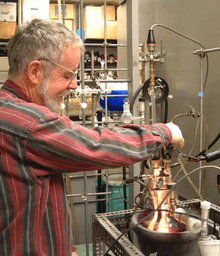Phil Shevlin
Professor Philip B. Shevlin is an American experimental chemist, based primarily at Auburn University.

Phil Shevlin making atomic carbon
Professor Shevlin is an internationally recognized research scientist. His special field of expertise is centered on the chemistry of high energy reactive intermediates. These intermediates include atomic carbon, carbenes, monovalent carbon species and other energetic molecules.
Professor Shevlin is also involved in the synthesis of a variety of carbocyclic and heterocyclic nucleoside analogs.
Curriculum vitae
- 1965-1966 Research Associate, Brookhaven National Laboratory
- 1966-1968 U.S. Army
- 1968-1970 Research Associate, Brookhaven National Laboratory
- 1970-1974 Assistant Professor, Auburn University
- 1974-1979 Associate Professor, Auburn University
- 1979 -1998 Professor, Auburn University
- 1998- 2002 Mosley Professor of Science and Humanities, Auburn University
- 2002- Professor Emeritus, Auburn university
Education
- B. S. Lafayette College, Easton, PA, 1961
- M. S. Yale University, New Haven, CT, 1963
- Ph.D. Yale University, New Haven, CT, 1966
Books
- Shevlin, P. B. and Campbell, O. A.. Concepts of Science; Kendall/Hunt: Dubuque, IA, 2nd Edition, 1995.
- Shevlin, P. B.,Concepts of Science; Kendall/Hunt: Dubuque, IA, 1993.
gollark: At power 0.5, so it only damages grass and unlucky people.
gollark: Stick a turtle/manipulator/whatever in the middle of the field, and have it constantly fire lasers in random directions on the, er, XZ plane?
gollark: We don't need a lawnmower mod. Lasers are perfectly capable of mowing.
gollark: I think it prioritizes the helmet.
gollark: Luca_S: you can wear two; bauble + helmet slot.
This article is issued from Wikipedia. The text is licensed under Creative Commons - Attribution - Sharealike. Additional terms may apply for the media files.